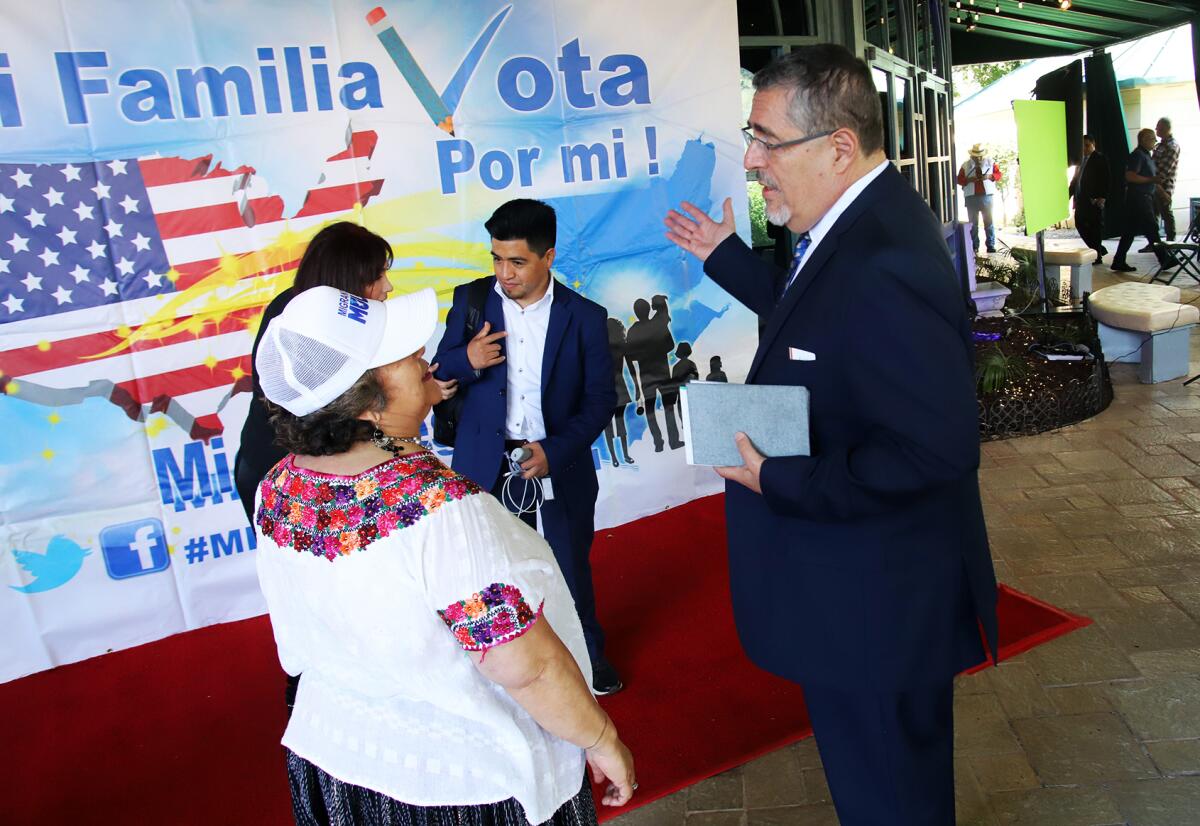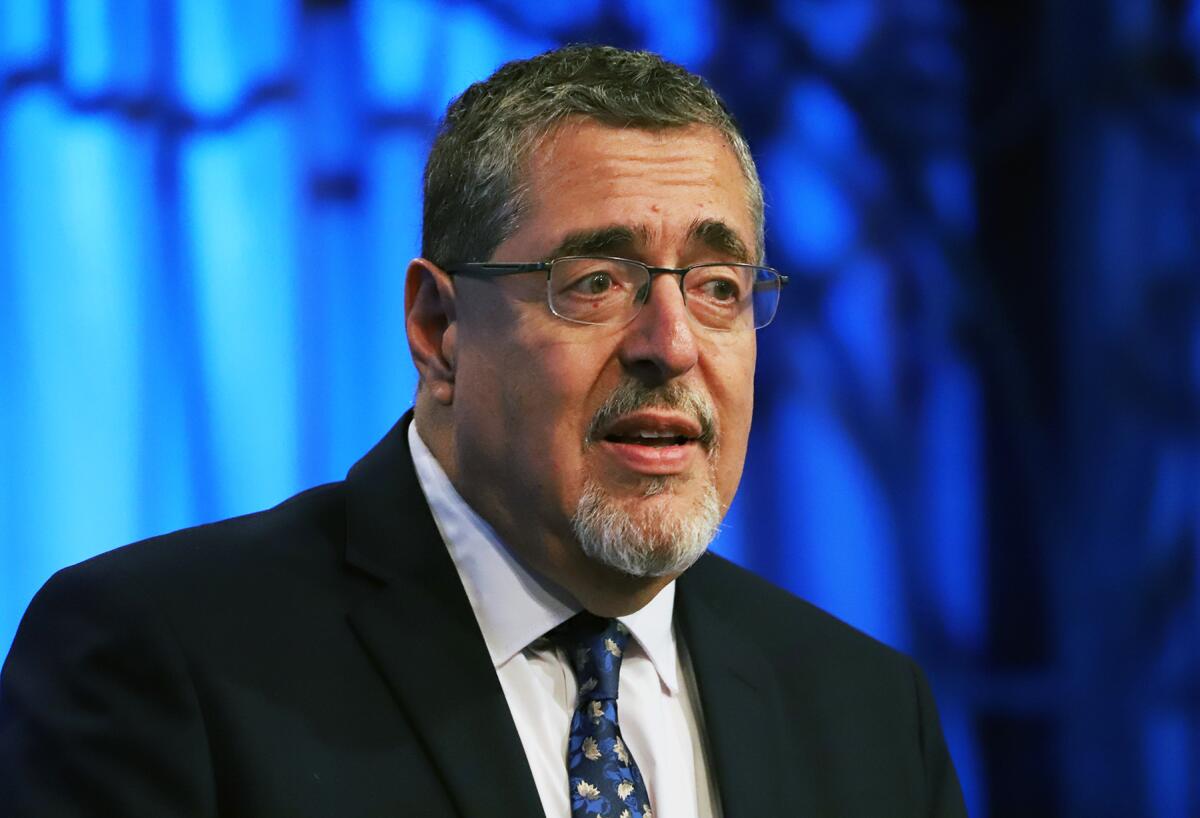U.S. Guatemalans hope presidential candidate Bernardo Arévalo may be light at end of tunnel

LOS ÁNGELES — In the first round of Guatemala’s presidential election earlier this summer, the so-called “null vote” received more support than most of the candidates did — a symbolic rejection of the ruling political class, by voters both in the homeland and U.S. immigrants.
In contrast, second round voting, which will take place Sunday, is raising hope among many voters who will elect the next president and vice president of Central America’s most populous country.
The two contenders are Sandra Torres, candidate of the formerly democratic, increasingly right-leaning National Unity of Hope (UNE), who obtained 881,592 votes (15.8%) in the first round.
Her opponent is Bernardo Arévalo, candidate of the center-left Movimiento Semilla party, whose vote tally of 654,534 (11.7%) stunned supporters, pundits and pollsters. Arévalo’s progressive values, and his fight against corruption and impunity, have made him a target of attacks from the political establishment.
“We were all in shock” over Arévalo’s surprisingly strong showing, said Eduardo Estrada, 63, a psychologist and family counselor originally from Guatemala City.
Arévalo’s ascent to the second round caused a political earthquake. The same day that the Supreme Electoral Tribunal (TSE) announced that the Semilla candidate would face Torres in the August 20 run-off, a court ordered the suspension of the legal status of Arévalo’s party for alleged corruption, which set off a series of protests and legal skirmishes.
The electoral process was able to move forward only after the Constitutional Court intervened. But Arévalo supporters fear that his adversaries will continue seeking ways to disrupt his candidacy.
The day after the elections, as official results were confirmed, Estrada’s cell phone vibrated incessantly with calls and text messages from euphoric compatriots who glimpsed what they regarded as a light at the end of the tunnel following a years-long breakdown of the rule of law dating back to the administration of Otto Pérez Molina (2012-2015).
“Most people know that this change is necessary,” said Estrada, a former student leader in Guatemala who arrived in Los Angeles in 1984 as a refugee fleeing military persecution. He and other compatriots have been organizing since June 26 to invite members of the U.S. community to vote in Guatemala’s presidential election.
In the United States, 90,708 Guatemalans are registered to vote in Los Angeles and 14 other electoral centers. But in the first round, absenteeism and a slew of TSE procedural problems resulted in only 1,443 people being able to cast votes.
Of those immigrants who were able to vote, 38.1% cast a “null” ballot. The candidate who received the lowest percentage of the immigrant vote was Manuel Conde, of the ruling Vamos party (1.3%). Torres obtained 3.9% of the votes in the United States, while the candidates with the greatest support were the daughter of the former dictator Efraín Ríos Montt, Zury Ríos (12.1%) Edmond Mulet (11.8%) and Arévalo (11.3%).
Torres, 67, formerly served as first lady during the presidency of her then-husband Álvaro Colom (2008-2011). This is the third time that she has reached the second round. The previous two times she was defeated by Jimmy Morales, then by Alejandro Giammattei, the country’s current president. Representatives from the UNE party, led by Torres, have been allies of Morales and Giammattei in Congress.
“Sandra Torres means maintaining the status quo we have right now. Arévalo represents the hope that Guatemala can be changed,” said Manuel Pérez, a native of the Guatemalan province of Petén.

Arévalo, 64, is a sociologist and diplomat by profession. He has been Vice Minister of Foreign Affairs and Ambassador to Spain and is one of the founders of Movimiento Semilla, which was legally registered in 2018. He is currently a deputy in the Guatemalan Congress. His father, Juan José Arévalo Bermejo, was president of Guatemala from 1945 to 1951.
“There are several mixed feelings. On the one hand, concern and on the other enthusiasm and hope,” said Xuana Mulul, an immigrant of Maya Kʼicheʼ origin. The 50-year-old woman has been urging her community in Southern California to get people out to vote here and in Guatemala. “It’s not that things are going to automatically change, it’s a start of change,” she continued.
Others took a starkly dimmer view.
“Arévalo is going to extend the agony of Guatemala and in a year you are going to see the people protesting against him,” said Mario Ávila, an activist who leans toward the leftist Movement for the Liberation of the Peoples (MLP), whose presidential candidate, the indigenous leader Thelma Cabrera, was blocked from running by the electoral authorities. “People have the expectation that everything will change, but it is not true because there are very deep interests of the country’s oligarchy.”
Julio Villaseñor, a Guatemalan leader in L.A., predicted social upheaval in the days ahead.
“There are many enthusiastic, they want a Messiah to come to change things,” he said. “If Semilla manages to win and they cancel it as a party, then all that will be missing in the streets will be a match for those masses to light up, and there will be a tremendous catastrophe in Guatemala.”







